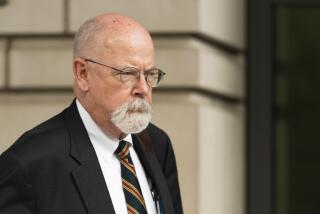U.S. Apparently Drops Northrop Bribery Probe
- Share via
After a five-year investigation, the Justice Department is dropping its probe into allegations that Northrop Corp. and its key executives bribed South Korean officials in an effort to sell the F-20 jet fighter, according to legal sources and Justice Department correspondence.
Welko Gasich, retired executive vice president of the Los Angeles-based company, was notified by Justice officials late last week that he “is no longer under investigation,” thereby clearing him of any wrongdoing in the tangled matter. Gasich, 72, was forced out of his job as a result of the controversy.
Other targets of the probe have not received such explicit letters, but federal authorities have returned their personal documents subpoenaed as evidence in the late 1980s, and sources close to the case said it appears dead.
An agency spokesman declined comment.
The Northrop matter is the latest defense industry scandal abandoned by the Justice Department after the careers and reputations of individuals were ruined. Similar cases involved senior General Dynamics and Hughes Aircraft executives.
The Northrop case involved a cast of unusual characters and a plot revolving around a bizarre plan to build a $6.25-million luxury hotel in Seoul, allegedly part of an illegal sales-promotion fund to sell the F-20 to the South Korean air force.
Northrop claimed that it was an innocent victim, duped by a ring of South Korean swindlers. In 1984, Northrop wired $6.25 million for the hotel to a Hong Kong bank account controlled by a girlfriend of the late South Korean powerbroker Chong Kyu Park. A few days later, the money disappeared. Later, the company paid an additional $1.5 million to an organization controlled by Park to extricate itself from its South Korean involvement.
Allegations that the South Korean deals were actually a front for improper foreign payments were first raised in a letter written by Jimmy Shin, a onetime Honolulu nightclub operator hired by Northrop to help Park sell its F-20 fighters to South Korea.
Northrop insisted for years during the Justice Department probe that the hotel plan was a goodwill gesture. But when the company sued to recover its money, two private arbitration panels and a South Korean judge ruled that the payments appeared questionable and were probably paid for purposes other than the hotel. Northrop lost all three cases.
Through it all, Gasich said he had only a technical role in the F-20 program and had no direct responsibility for selecting any of the South Korean contacts or in conceiving of the hotel deal.
But when allegations began to fly in 1987, the engineer ended up as the fall guy for the mess. He was forced to retire in 1989 with an offer by Northrop Chairman Thomas V. Jones for a “really nice party.”
“It has been tough going,” Gasich said Tuesday. “The thing that has bothered me is that the company hasn’t backed me up and I gave my life to this company for 35 years.”
During his lengthy career, Gasich, a Stanford University engineering graduate, played a key role in developing the B-2 bomber and the F-5 jet fighter.
A number of other Northrop executives were drawn into the South Korean controversy. James Dorsey, who was Northrop’s marketing vice president for South Korea, recently received a letter returning his personal documents, according to his attorney, Daniel Bookin.
“Our understanding is that the investigation is closed,” Bookin said.
Jan Lawrence Handzlik, who represented former Northrop official Donald Foulds, said: “The investigation should have been dropped long ago. Mr. Foulds was involved in legitimate investment activity in South Korea on behalf of Northrop. The government decision to close the matter confirms this.”
The Justice Department recently asked Northrop to “arrange to pick up” three wooden pallets of its records subpoenaed by a federal grand jury in Los Angeles. Northrop officials declined comment.
Justice officials have written a voluminous secret memorandum to explain why they were declining to prosecute, but an agency spokesman refused to comment on the matter Tuesday.
The government’s case was flawed because it was mainly supported by unreliable witnesses, many of them foreign nationals, attorneys close to the case said Tuesday.
Although Northrop has escaped federal indictment, one attorney close to the case said the corporation was not the innocent victim, as it claimed. Federal agents have long complained that the government bungled its case against the corporation.
In setting up its hotel deal, Northrop violated a number of its own internal corporate policies that had been enacted after a 1970s scandal over bribes paid to foreign officials. Northrop executives signed the hotel deal before asking for board approval and then wired the funds before concerns raised by the board were resolved.
The Northrop board reprimanded Jones, the former chairman, for his role in the South Korean affair. At a 1988 congressional hearing, former Northrop Director O. Meredith Wilson testified that the company’s management had exercised “bad business practices” and that Jones’ expression to the board of his trust in the South Koreans was “misplaced.”
In 1991, four Northrop insurers agreed to pay $18 million to settle allegations of misconduct and unlawful business practices by Northrop officers and directors brought under a shareholder lawsuit.
More to Read
Inside the business of entertainment
The Wide Shot brings you news, analysis and insights on everything from streaming wars to production — and what it all means for the future.
You may occasionally receive promotional content from the Los Angeles Times.











